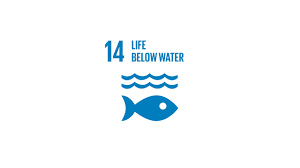Sustainable Development Goal 14: Life Below Water
Sustainable Development Goal 14 (SDG 14) focuses on conserving and sustainably using the oceans, seas, and marine resources for sustainable development. Also known as “Life Below Water,” this goal addresses the critical need to protect marine ecosystems and promote sustainable practices that ensure the health of our oceans.
Key Objectives of SDG 14:
- Conserve and sustainably use marine resources for sustainable development
- Protect and restore marine ecosystems to enhance their resilience
- Reduce marine pollution, including nutrient pollution and marine litter
- Sustainably manage and protect marine and coastal ecosystems to avoid significant adverse impacts
- Regulate harvesting to prevent overfishing, illegal fishing, and destructive fishing practices
- Enhance conservation and sustainable use of ocean-based resources through international cooperation
The oceans play a crucial role in supporting life on Earth by regulating the climate, providing food security, and supporting biodiversity. However, human activities such as overfishing, pollution, habitat destruction, and climate change have put immense pressure on marine ecosystems.
By achieving SDG 14, we can ensure the long-term health of our oceans and secure a sustainable future for generations to come. It requires collective action from governments, businesses, civil society, and individuals to implement policies and practices that promote sustainable management of marine resources.
Together, we can work towards preserving life below water and creating a more sustainable planet for all.
5 Essential Tips for Supporting Sustainable Development Goal 14: Life Below Water
- Reduce plastic usage by opting for reusable alternatives like metal straws and water bottles.
- Support local sustainable fisheries by choosing seafood that is sourced responsibly.
- Participate in beach clean-up activities to help protect marine ecosystems from pollution.
- Educate others about the importance of ocean conservation and sustainable fishing practices.
- Advocate for policies that aim to reduce ocean acidification and preserve marine biodiversity.
Reduce plastic usage by opting for reusable alternatives like metal straws and water bottles.
By reducing plastic usage and opting for reusable alternatives such as metal straws and water bottles, we can contribute to the achievement of Sustainable Development Goal 14: Life Below Water. Plastic pollution poses a significant threat to marine ecosystems, harming marine life and degrading the health of our oceans. Making simple switches to reusable items not only helps in reducing plastic waste but also promotes sustainable practices that protect our oceans for future generations. Let’s take small steps towards a more sustainable future by choosing eco-friendly alternatives that benefit both the environment and marine life.
Support local sustainable fisheries by choosing seafood that is sourced responsibly.
Supporting local sustainable fisheries by choosing seafood that is sourced responsibly is a simple yet impactful way to contribute to Sustainable Development Goal 14: Life Below Water. By opting for seafood from fisheries that follow sustainable practices, we can help protect marine ecosystems, promote biodiversity, and ensure the long-term health of our oceans. Making informed choices about the seafood we consume not only supports local fishermen and communities but also plays a significant role in preserving life below water for future generations.
Participate in beach clean-up activities to help protect marine ecosystems from pollution.
Participating in beach clean-up activities is a proactive way to contribute to Sustainable Development Goal 14, which focuses on conserving and sustainably using marine resources. By getting involved in these initiatives, individuals can play a direct role in protecting marine ecosystems from pollution. Removing litter and waste from beaches not only helps prevent harmful substances from entering the ocean but also promotes awareness about the importance of maintaining clean and healthy coastal environments. Through collective efforts like beach clean-ups, we can make a tangible difference in safeguarding life below water for future generations.
Educate others about the importance of ocean conservation and sustainable fishing practices.
Educating others about the importance of ocean conservation and sustainable fishing practices is a crucial step towards achieving Sustainable Development Goal 14. By raising awareness about the fragility of marine ecosystems and the impact of unsustainable fishing practices, we can inspire individuals and communities to make informed choices that support the health of our oceans. Through education, we empower people to take action, advocate for policy changes, and adopt responsible behaviours that contribute to the long-term sustainability of our marine resources.
Advocate for policies that aim to reduce ocean acidification and preserve marine biodiversity.
Advocating for policies that target the reduction of ocean acidification and the preservation of marine biodiversity is crucial in achieving Sustainable Development Goal 14. By supporting initiatives that address these pressing issues, we can safeguard the health and resilience of our oceans. Ocean acidification poses a significant threat to marine ecosystems, impacting the survival of marine species and disrupting food chains. Preserving marine biodiversity is essential for maintaining the balance of aquatic life and ensuring sustainable fisheries. Through advocacy and policy support, we can contribute to the protection of our oceans and work towards a more sustainable future for all.
